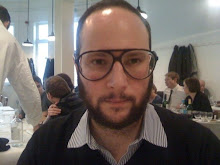



Barbara Wien, Wilma Lukatsch and Wenke Nitz wearing their double Chac Mool t-shirts

Mariana Castillo to the left, and Diane Deball dancing at the opening

Views of the bookshop and smoking balcony
Mariana Castillo Deball
We are silently illiterate
Wien Lukatsch
Galerie und Buchhandlung fuer Kunstbuecher
September 6 – November 4, 2011
Mariana Castillo Deball (born 1975 in Mexico City, currently artist in residency at DAAD in Berlin) will open our new space with the exhibition We are silently illiterate. An uncomfortable title, perhaps an Uncomfortable Object in itself?
The exhibition deals with Uncomfortable Objects. It is populated with non-humans, that tell their own stories, and of potential images, that can be constructed by the viewer. Both are aesthetic concepts that are unfolded by Deball in films, sculptures and books. All of these make clear that perception is a tricky thing. The anthropologist Roy Wagner puts it like this: The brain is the only organ in the body that is narcissistic enough to actually believe it is thinking.
An example for this concept of Uncomfortable objects is the film El Donde estoy va desapareciendo / The where I am is vanishing Deball produced for this year’s Venice Biennale in cooperation with our gallery. The piece is based on the Borgia Codex, one of the few pre-Columbian Mesoamerican codices which survived the book-burning policies of the Spanish conquerors. The film tells, from the point of view of the Borgia Codex, the different adventures and transformations, from how it was brought to Europe and stored unread for many hundred years in a collection of the Vatican in Rome before it was eventually deciphered by a Mexican Jesuit (and Alexander von Humboldt). The book tells its odyssey in the languages of its different owners. The story is accompanied by ink drawings that pass the viewer as a long and calm leporello of images. This 10 meters long leporello is shown besides the film at the Venice Biennale. In our exhibition we present the film vocabulary on separate ink drawings.
Another part of these Uncomfortable Objects are colorful sculptures made out of papier-mâché, a flexible and simple material that is widely used in Mexico. The sculptures behave as epiphytes plants, such as bromeliads or orchids that grow upon another plant or sometimes upon some other object, without a parasite behavior. They are also called air plants. The sculptures are populated by images based on Deball’s experience in Brazil during the last two years. They include people, places and travels where she followed the inconstancy of the savage soul, discovering its generosity, flexibility and playfulness. The Museum of the images of the unconscious, where she discovered their amazing archive and the paintings of Artur Amora, the National Museum, where she learned about Amerindian perspectivism, the house of Lina Bo Bardi in Sao Paulo, her exhibitions of popular art, the botanical garden in Rio de Janerio, the wastelands of papier-maché sculptures after the carnival, Glauber Rocha, mathematical models of non-linear figures, and many more.
First Deball collected dialogues and fables among non-humans, such as Aesop's fables, Ovid’s metamorphoses, Lewis Carroll’s dialogues, and fables by Augusto Monterroso, Horacio Quiroga, Antonin Artaud, Sor Juana Ines de la Cruz, Mario de Andrade, Franz Kafka, and Montaigne. At the beginning she found these dialogues only in fiction literature, but afterwards she found experiments of that sort among historians of science, philosophers, and anthropologists. She explains the reason for dedicating a whole series of exhibitions and books to these Uncomfortable Objects in an interview with Tobias Ostrander: What non-humans have to say about the world we constructed around them, about our definitions, manipulations and usages? What is left of the objects after so much historical maneuvering and what would be the testimony of these objects if they could tell us their story from their perspective? Our contemporary society is crowded with uncomfortable objects, products of desire, research or imagination; they trigger our conception of the world and compel us to take a position, to change completely our basic understanding of the universe. Uncomfortable objects are constantly being erased, replaced, neutralized and destroyed in order to give space to new things, but this erasure is never complete, we are surrounded more and more by things, quasi-things, fragments, distortions and hybrids (….) …but we don’t know how to deal with this diversity…
Mariana Castillo Deball has also published a new book:
Mariana Castillo Deball & Roy Wagner.
Coyote Anthropology: A Conversation in Words and Drawings / Koyotenanthropologie. Ein Gespraech in Worten und Zeichnungen.
No. 24 der Reihe 100 Notes – 100 Thoughts / 100 Notizen – 100 Gedanken.
dOCUMENTA (13), Hatje/Cantz Ostfildern 2011
(6 Euro)
www.wienlukatsch.de















No comments:
Post a Comment